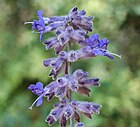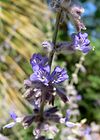Note: This is a project under development. The articles on this wiki are just being initiated and broadly incomplete. You can Help creating new pages.
Difference between revisions of "Perovskia atriplicifolia - Russian sage"
(→Uses) |
(→References) |
||
| (9 intermediate revisions by 2 users not shown) | |||
| Line 4: | Line 4: | ||
==Uses== | ==Uses== | ||
| − | {{Uses|Indigestion}}, {{Uses|Fever}}, {{Uses|Cold }}. | + | {{Uses|Indigestion}}, {{Uses|Fever}}, {{Uses|Cold}}. |
==Parts Used== | ==Parts Used== | ||
| Line 32: | Line 32: | ||
==Habit== | ==Habit== | ||
| − | {{Habit| | + | {{Habit|Evergreen shrub}} |
==Identification== | ==Identification== | ||
| Line 39: | Line 39: | ||
===Flower=== | ===Flower=== | ||
| − | {{Flower|Unisexual|2-4cm long| | + | {{Flower|Unisexual|2-4cm long|Lavender-blu|5|Each stem ends with long, thin flower panicles}} |
===FruitGeneral=== | ===FruitGeneral=== | ||
| − | {{Fruit||7–10 mm| | + | {{Fruit||7–10 mm|Clearly grooved lengthwise, Lowest hooked hairs aligned towards crown||}} |
===Other features=== | ===Other features=== | ||
==List of Ayurvedic medicine in which the herb is used== | ==List of Ayurvedic medicine in which the herb is used== | ||
| − | |||
==Where to get the saplings== | ==Where to get the saplings== | ||
| Line 54: | Line 53: | ||
==How to plant/cultivate== | ==How to plant/cultivate== | ||
| − | + | Can be grown from seeds, but germination can take up to 4 months. Can also be propagated by root divisions taken from mature plants <ref name="How to plant/cultivate"/> | |
==Commonly seen growing in areas== | ==Commonly seen growing in areas== | ||
| − | {{Commonly seen|Mediterranean coast}}, {{Commonly seen| | + | {{Commonly seen|Mediterranean coast}}, {{Commonly seen|Hills in croatia}}, {{Commonly seen|Islands of veglia}}. |
==Photo Gallery== | ==Photo Gallery== | ||
| Line 76: | Line 75: | ||
<references> | <references> | ||
| − | <ref name="chemical composition">[https://www.botanical.com/botanical/mgmh/s/sages-05.html | + | <ref name="chemical composition">[https://www.botanical.com/botanical/mgmh/s/sages-05.html Chemical constituents]</ref> |
| − | <ref name="Leaf">[https://www.thespruce.com/how-to-grow-russian-sage-1402795 | + | <ref name="Leaf">[https://www.thespruce.com/how-to-grow-russian-sage-1402795 Plant description]</ref> |
| − | <ref name="How to plant/cultivate">[https://www. | + | <ref name="How to plant/cultivate">[https://www.thespruce.com/how-to-grow-russian-sage-1402795 How to Grow]</ref> |
</references> | </references> | ||
| Line 91: | Line 90: | ||
[[Category:Herbs]] | [[Category:Herbs]] | ||
| + | [[Category:Lamiaceae]] | ||
Latest revision as of 11:42, 30 June 2020
Russian sage is a flowering herbaceous perennial plant and subshrub.
Contents
- 1 Uses
- 2 Parts Used
- 3 Chemical Composition
- 4 Common names
- 5 Properties
- 6 Habit
- 7 Identification
- 8 List of Ayurvedic medicine in which the herb is used
- 9 Where to get the saplings
- 10 Mode of Propagation
- 11 How to plant/cultivate
- 12 Commonly seen growing in areas
- 13 Photo Gallery
- 14 References
- 15 External Links
Uses
Indigestion, Fever, Cold.
Parts Used
Chemical Composition
At least 10 compounds have been isolated from Russian sage for study and most of them are relatively innocuous. Lupeol, for example, also known as fagarsterol, is a plant sterol found in many plants and fruits with beneficial uses[1]
Common names
| Language | Common name |
|---|---|
| Kannada | |
| Hindi | |
| Malayalam | |
| Tamil | |
| Telugu | |
| Marathi | NA |
| Gujarathi | NA |
| Punjabi | NA |
| Kashmiri | NA |
| Sanskrit | |
| English | Russian Sage |
Properties
Reference: Dravya - Substance, Rasa - Taste, Guna - Qualities, Veerya - Potency, Vipaka - Post-digesion effect, Karma - Pharmacological activity, Prabhava - Therepeutics.
Dravya
Rasa
Tikta (Bitter), Kashaya (Astringent)
Guna
Laghu (Light), Ruksha (Dry), Tikshna (Sharp)
Veerya
Ushna (Hot)
Vipaka
Katu (Pungent)
Karma
Kapha, Vata
Prabhava
Habit
Identification
Leaf
| Kind | Shape | Feature |
|---|---|---|
| Simple | Russian sage grows as a many stemmed clump and The foliage is finely cut gray-green leaves that are slightly scented |
Flower
| Type | Size | Color and composition | Stamen | More information |
|---|---|---|---|---|
| Unisexual | 2-4cm long | Lavender-blu | 5 | Each stem ends with long, thin flower panicles |
FruitGeneral
| Type | Size | Mass | Appearance | Seeds | More information |
|---|---|---|---|---|---|
| 7–10 mm | Clearly grooved lengthwise, Lowest hooked hairs aligned towards crown | {{{6}}} |
Other features
List of Ayurvedic medicine in which the herb is used
Where to get the saplings
Mode of Propagation
How to plant/cultivate
Can be grown from seeds, but germination can take up to 4 months. Can also be propagated by root divisions taken from mature plants [3]
Commonly seen growing in areas
Mediterranean coast, Hills in croatia, Islands of veglia.
Photo Gallery
References
External Links
- Ayurvedic Herbs known to be helpful to treat Indigestion
- Ayurvedic Herbs known to be helpful to treat Fever
- Ayurvedic Herbs known to be helpful to treat Cold
- Herbs with Folaige used in medicine
- Herbs with Whole herb used in medicine
- Herbs with common name in English
- Habit - Evergreen shrub
- Index of Plants which can be propagated by Seeds
- Index of Plants which can be propagated by Cuttings
- Herbs that are commonly seen in the region of Mediterranean coast
- Herbs that are commonly seen in the region of Hills in croatia
- Herbs that are commonly seen in the region of Islands of veglia
- Herbs
- Lamiaceae










